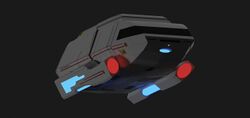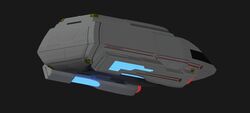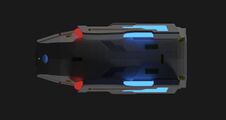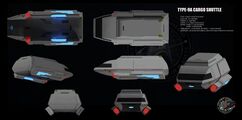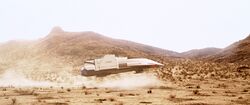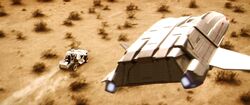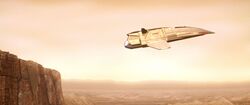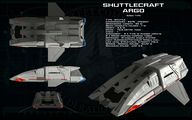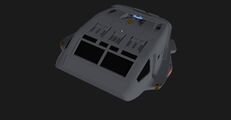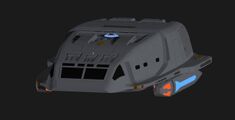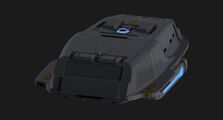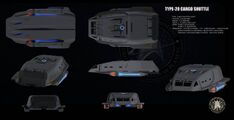Difference between revisions of "Cargo Shuttles"
CrimsonTacit (talk | contribs) m |
CrimsonTacit (talk | contribs) |
||
| Line 1: | Line 1: | ||
{{icons|bfc | {{icons|bfc}}'''Cargo Shuttles''' are larger than personnel shuttles and are used to move larger quantities of cargo across larger distances than is practical with a cargo train being pulled by a [[Maintenance Craft#Cargo Management Unit|CMU]]. They are also useful for moving cargo between a ship and a planet when conditions do not allow for the use of the transporter. Their warp engines are generally as limited as personnel shuttles, and so they are most effective at travel within the same star system and most often have a crew of three or four. | ||
==Type-9A Cargo Shuttle== | ==Type-9A Cargo Shuttle== | ||
Revision as of 21:22, 28 June 2022
Cargo Shuttles are larger than personnel shuttles and are used to move larger quantities of cargo across larger distances than is practical with a cargo train being pulled by a CMU. They are also useful for moving cargo between a ship and a planet when conditions do not allow for the use of the transporter. Their warp engines are generally as limited as personnel shuttles, and so they are most effective at travel within the same star system and most often have a crew of three or four.
Type-9A Cargo Shuttle
Template:SmallCraftSpecifications An enhanced version of the older Type-9 cargo shuttle, the Type-9A is a ubiquitous cargo transport around Federation space. It's designed to move things further distances than can be accomplished with a cargo train, such as across a star system, but it's too slow for missions much longer than a day or so. They are uncommon on starships but most starbases have a small fleet of them. They're also common in civilian hands, and many large freighters also embark them.
The shuttle's cockpit is small and has two stations for a pilot and co-pilot, as well as a two-place transporter. Aft of this is a small area with four bunks and a replicator, followed by the cargo hold. There are specialized rails on the floor that can accommodate various systems for holding ground vehicles, but which can also be removed quickly when the craft is being used for general cargo duties.
Type-17 Cargo Shuttle
Template:SmallCraftSpecificationsThe Type-17 Cargo Shuttle is primarily used for ground-to-orbit transport missions. It was developed to support away teams for survey missions and only needs a crew of two. It is often used to transport ground vehicles such as buggies or hovercars to support extended stays in planets, and as such it has a small crew rest area in the middle of the craft, to allow them to use the shuttle as a home base. Unlike most other cargo shuttles, these are commonly posted aboard front-line starships and are used for a huge variety of missions.
The forward area contains a cockpit with two stations, as well as a jumpseat for a cargo specialist or passenger. Aft of this, there are two large side hatches which fold down to ramps over the warp nacelles to the ground. Cargo is stored in the section aft of this, and the floor has specialized gravity plating to hold things in place during flight. The aft end of the shuttle has another large hatch that can also fold down as a ramp. The shuttle has forward and aft phaser arrays, as well as graviton shielding, given that these lumbering vessels are attractive targets to pirates, but they generally don't operate in areas where they are more than an hour or so from getting help.
Type-20 Cargo Shuttle
Template:SmallCraftSpecifications The Type-20 cargo shuttle is a large craft that is capable of true interstellar journies, with a top speed of Warp 6. It was built to handle transporting important goods between systems without the need for a full freighter and its crew. They are nearly twice as large as the Type-9 and have become very common in the core worlds, handling routes that are short enough to be run in a matter of a few days, as opposed to weeks-long and months-long journies undertaken by freighters. They have proven popular with their crews, because of their relative comfort compared to other cargo shuttles as well.
While it can be operated with just a crew of two, the standard complement on the Type-20 for long and medium-range missions is four. The craft has a forward cockpit with stations for a pilot, co-pilot, cargo specialist, and engineer, as well as a transporter. Aft of this are two side hatches that allow access to the ground via a step on the nacelles. Amidships, there is a small crew rest area with four bunks, a replicator, and a table and chairs for meals, as well as a head and storage for equipment. The warp core is located above this area, along with other important systems. The cargo hold takes up the aft half of the vessel, with a roll-up door and folding ramp on the stern. The craft has four phaser arrays as well as shielding to defend itself against raiders, though it is even more cumbersome than the smaller Type-9.
